South Asia from Afar: Conversations on Research in the Region
This series seeks to draw attention to the complex power dynamics at play in studying the South Asian region in this moment, when the COVID-19 Pandemic and ongoing struggles against increasingly right-wing states in the region have all complicated the terms on which research can be done. The title 'South Asia from Afar' references the panic that overtook the many institutions for South Asian Studies research in Europe, the UK and North America where a significant part of the research on this region is done, with the onset of the COVID-19 pandemic. However the Pandemic has also made distances within South Asia larger as scholars increasingly rely on remote modes of research instead of in-person fieldwork in this moment. Address this convergence of many crisis points, we ask our speakers to consider how research on the region might be reimagined. The series is co-organised by Sneha Krishnan and Nayanika Mathur.
Co-sponsored by the Contemporary South Asian Studies Programme.
Session Four: 22 September 2020, 2-3 PM BST
This series was prompted by our wanting to comment on the panic that was running through scholars of South Asia located in the UK, as well as in Europe and North America that this summer, they couldn't make the usual annual research trip to the region thanks to COVID-19. At the same time, we'd also been thinking of how the pandemic was only the last of many impediments to 'academia as usual'. Right wing regimes everywhere - both here and in South Asia - are changing the way people are able to travel and restricting what academics can really write without fear of reprisal. But 'afar' is really a generative jumping off point and we're hoping that our speakers each week will bring their own reflections into what it means.
This week we have with us Nida Kirmani, Srila Roy and Mona Bhan.
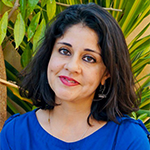 Nida Kirmani is Associate Professor of Sociology in the Mushtaq Ahmad Gurmani School of Humanities and Social Sciences at the Lahore University of Management Sciences. She is also Faculty Director of the Saida Waheed Gender Initiative. Nida has published widely on issues related to gender, Islam, women's movements, development and urban studies in India and Pakistan. Her book, Questioning 'the Muslim Woman': Identity and Insecurity in an Urban Indian Locality, was published in 2013 by Routledge. Her current research focuses on urban violence, gender and insecurity in the area of Lyari in Karachi.
Nida Kirmani is Associate Professor of Sociology in the Mushtaq Ahmad Gurmani School of Humanities and Social Sciences at the Lahore University of Management Sciences. She is also Faculty Director of the Saida Waheed Gender Initiative. Nida has published widely on issues related to gender, Islam, women's movements, development and urban studies in India and Pakistan. Her book, Questioning 'the Muslim Woman': Identity and Insecurity in an Urban Indian Locality, was published in 2013 by Routledge. Her current research focuses on urban violence, gender and insecurity in the area of Lyari in Karachi.
 Srila Roy is associate professor of sociology and heads development studies at the University of the Witwatersrand, South Africa. She is the author of Remembering Revolution: Gender, Violence and Subjectivity in India's Naxalbari Movement (Oxford, 2012), co-editor of New South Asian Feminisms (Zed, 2012) and co-editor of New Subaltern Politics: Reconceptualising Hegemony and Resistance in Contemporary India (Oxford 2015). She is currently writing a monograph on feminist and queer politics in liberalised India and co-editing a volume of essays on #MeToo in India.
Srila Roy is associate professor of sociology and heads development studies at the University of the Witwatersrand, South Africa. She is the author of Remembering Revolution: Gender, Violence and Subjectivity in India's Naxalbari Movement (Oxford, 2012), co-editor of New South Asian Feminisms (Zed, 2012) and co-editor of New Subaltern Politics: Reconceptualising Hegemony and Resistance in Contemporary India (Oxford 2015). She is currently writing a monograph on feminist and queer politics in liberalised India and co-editing a volume of essays on #MeToo in India.
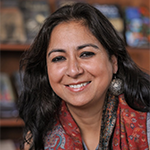 Mona Bhan is a cultural anthropologist whose work explores the role of economic and infrastructural development in counterinsurgency operations and people's resistance movements to protracted war and conflict. Her areas of specialization include border wars and counterinsurgency, militarism and humanitarianism, race, gender, and religion, environmentalism and climate change, occupation and human rights, space and place, water and infrastructure in Indian occupied Kashmir. She is the author of Counterinsurgency, Development, and the Politics of Identity: From Warfare to Welfare? (Routledge, 2014), co-author of Climate without Nature: A Critical Anthropology of the Anthropocene (Cambridge University Press, 2018) and co-editor of Resisting Occupation in Kashmir (University of Pennsylvania Press).
Mona Bhan is a cultural anthropologist whose work explores the role of economic and infrastructural development in counterinsurgency operations and people's resistance movements to protracted war and conflict. Her areas of specialization include border wars and counterinsurgency, militarism and humanitarianism, race, gender, and religion, environmentalism and climate change, occupation and human rights, space and place, water and infrastructure in Indian occupied Kashmir. She is the author of Counterinsurgency, Development, and the Politics of Identity: From Warfare to Welfare? (Routledge, 2014), co-author of Climate without Nature: A Critical Anthropology of the Anthropocene (Cambridge University Press, 2018) and co-editor of Resisting Occupation in Kashmir (University of Pennsylvania Press).
Video Recording of the Event
Session Three: 25 August 2020, 2-3 PM BST
Speakers:
 Debashree Mukherjee is Assistant Professor of film and media in the Department of Middle Eastern, South Asian, and African Studies (MESAAS) at Columbia University. Her forthcoming book, Bombay Hustle: Making Movies in a Colonial City (September 2020), investigates the material relations between cinema's bodies, machines, aesthetics, and environments as they intersect with practices of modernity and freedom in late colonial India. Debashree is an editor with the peer-reviewed journal BioScope: South Asian Screen Studies, and regularly curates exhibitions related to the history of Indian cinemas. In a previous life she worked in Mumbai's film and TV industries as an assistant director, writer, and cameraperson. Her next book project is tentatively titled "Mediated Ocean: A Techno-Aesthetic History of Migration Between Africa and Asia."
Debashree Mukherjee is Assistant Professor of film and media in the Department of Middle Eastern, South Asian, and African Studies (MESAAS) at Columbia University. Her forthcoming book, Bombay Hustle: Making Movies in a Colonial City (September 2020), investigates the material relations between cinema's bodies, machines, aesthetics, and environments as they intersect with practices of modernity and freedom in late colonial India. Debashree is an editor with the peer-reviewed journal BioScope: South Asian Screen Studies, and regularly curates exhibitions related to the history of Indian cinemas. In a previous life she worked in Mumbai's film and TV industries as an assistant director, writer, and cameraperson. Her next book project is tentatively titled "Mediated Ocean: A Techno-Aesthetic History of Migration Between Africa and Asia."
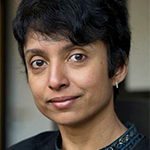 Nira Wickramasinghe is Chair and Professor of Modern South Asian studies at Leiden University in the Netherlands, as well as Director of Research at the Leiden University Institute for Area Studies. Before taking up her post in the Netherlands in 2010, she was a professor in the Department of History and International Relations at the University of Colombo, Sri Lanka. Her latest book, Slave in a Palanquin: Colonial Servitude and Resistance in Sri Lanka will be published by Columbia University Press in October 2020. Trained as a historian she has written on late colonial and modern Sri Lanka using a variety of archives. Some of her earlier books include: Sri Lanka in the Modern Age. A History (Oxford University Press 2015); Metallic Modern. Everyday machines in Colonial Sri Lanka (Berghahn 2014). She is presently involved in setting up a small academic press in Sri Lanka called Tambapanni Academic Publishers.
Nira Wickramasinghe is Chair and Professor of Modern South Asian studies at Leiden University in the Netherlands, as well as Director of Research at the Leiden University Institute for Area Studies. Before taking up her post in the Netherlands in 2010, she was a professor in the Department of History and International Relations at the University of Colombo, Sri Lanka. Her latest book, Slave in a Palanquin: Colonial Servitude and Resistance in Sri Lanka will be published by Columbia University Press in October 2020. Trained as a historian she has written on late colonial and modern Sri Lanka using a variety of archives. Some of her earlier books include: Sri Lanka in the Modern Age. A History (Oxford University Press 2015); Metallic Modern. Everyday machines in Colonial Sri Lanka (Berghahn 2014). She is presently involved in setting up a small academic press in Sri Lanka called Tambapanni Academic Publishers.
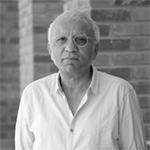 Deepak Mehta is Professor of Sociology at Ashoka University. He is a Ph.D from Delhi University. He has taught at the Delhi School of Economics, Department of Sociology at Delhi University and at Shiv Nadar University. He is the author of Work, Ritual, Biography: A Muslim Community in North India (OUP, 1997) and co-author of Living With Violence: An Anthropology of Events and Everyday Life (Routledge, 2007). His current research interests centre around the anthropology of material culture in its relationship to language and the body, and of law and violence.
Deepak Mehta is Professor of Sociology at Ashoka University. He is a Ph.D from Delhi University. He has taught at the Delhi School of Economics, Department of Sociology at Delhi University and at Shiv Nadar University. He is the author of Work, Ritual, Biography: A Muslim Community in North India (OUP, 1997) and co-author of Living With Violence: An Anthropology of Events and Everyday Life (Routledge, 2007). His current research interests centre around the anthropology of material culture in its relationship to language and the body, and of law and violence.
Video Recording of the Event
Session Two: 21 July 2020, 2-3 PM BST
Speakers:
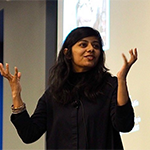 Samia Khatun is a feminist historian who researches the life-worlds of peoples colonised by the British Empire. Her first book Australianama: The South Asian Odyssey in Australia was published in 2019 and examined encounters between South Asian travellers and Australian Aboriginal peoples and the colonised knowledges that structures forgotten histories of Indian Ocean cosmopolitanism. She is working on a new project connecting ecological and economic histories of textiles industries in the Bengal delta. She recently moved from Dhaka to London and is Senior Lecturer at the Centre for Gender Studies at SOAS.
Samia Khatun is a feminist historian who researches the life-worlds of peoples colonised by the British Empire. Her first book Australianama: The South Asian Odyssey in Australia was published in 2019 and examined encounters between South Asian travellers and Australian Aboriginal peoples and the colonised knowledges that structures forgotten histories of Indian Ocean cosmopolitanism. She is working on a new project connecting ecological and economic histories of textiles industries in the Bengal delta. She recently moved from Dhaka to London and is Senior Lecturer at the Centre for Gender Studies at SOAS.
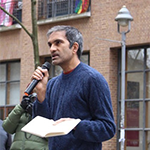 Rahul Rao is a Senior Lecturer in Politics at SOAS University of London. He is the author of Out of Time: The Queer Politics of Postcoloniality (2020) and Third World Protest: Between Home and the World (2010), both published by Oxford University Press. He is a member of the Radical Philosophy collective and blogs at The Disorder of Things.
Rahul Rao is a Senior Lecturer in Politics at SOAS University of London. He is the author of Out of Time: The Queer Politics of Postcoloniality (2020) and Third World Protest: Between Home and the World (2010), both published by Oxford University Press. He is a member of the Radical Philosophy collective and blogs at The Disorder of Things.
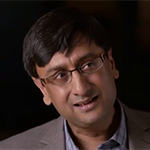 Santanu Das is Senior Research Fellow and Professor of Modern Literature and Culture at All Souls College, University of Oxford. His latest book India, Empire and First World War Culture: Writings, Images, and Songs (Cambridge, 2018) was awarded the Hindu Non-Fiction Prize this year.
Santanu Das is Senior Research Fellow and Professor of Modern Literature and Culture at All Souls College, University of Oxford. His latest book India, Empire and First World War Culture: Writings, Images, and Songs (Cambridge, 2018) was awarded the Hindu Non-Fiction Prize this year.
Video Recording of the Event
Session One: 23 June 2020, 2-3 PM BST
Our speakers for this inaugural event were:
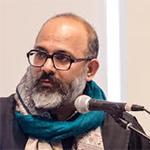 Manan Ahmed, Associate Professor, is a historian of South Asia and the littoral western Indian Ocean world from 1000-1800 CE. His areas of specialization include intellectual history in South and Southeast Asia; critical philosophy of history, colonial and anti-colonial thought.
Manan Ahmed, Associate Professor, is a historian of South Asia and the littoral western Indian Ocean world from 1000-1800 CE. His areas of specialization include intellectual history in South and Southeast Asia; critical philosophy of history, colonial and anti-colonial thought.
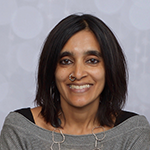 Ajantha Subramanian is Professor of Anthropology and South Asian Studies at Harvard University. Her first book, Shorelines: Space and Rights in South India (Stanford University Press, 2009; Yoda Press, 2013), chronicles the struggles for resource rights by Catholic fishers on India's southwestern coast, with a focus on how they have used spatial imaginaries and practices to constitute themselves as political subjects. Her second book, The Caste of Merit: Engineering Education in India (Harvard University Press, 2019), analyzes meritocracy as a terrain of caste struggle in India and its implications for democratic transformation.
Ajantha Subramanian is Professor of Anthropology and South Asian Studies at Harvard University. Her first book, Shorelines: Space and Rights in South India (Stanford University Press, 2009; Yoda Press, 2013), chronicles the struggles for resource rights by Catholic fishers on India's southwestern coast, with a focus on how they have used spatial imaginaries and practices to constitute themselves as political subjects. Her second book, The Caste of Merit: Engineering Education in India (Harvard University Press, 2019), analyzes meritocracy as a terrain of caste struggle in India and its implications for democratic transformation.
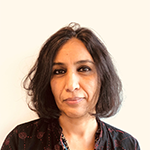 Ravinder Kaur is Associate Professor of Modern South Asia at the University of Copenhagen where she also directs the Centre of Global South Asian Studies. Her current work delves into the history of Indian economic reforms and the attendant rise of investment-fueled cultural nationalism in the 21st century. She is the author of Brand New Nation: Capitalist Dreams and Nationalist Designs in Twenty-First Century India (Stanford University Press, 2020); Since 1947: Partition Narratives among Punjabi Migrants of Delhi (Oxford University Press, 2007/2018) She has edited or co-edited a number of journal special issues including 'Southern Futures: Thinking through Emerging Markets,' in Comparative Studies in South Asia, Africa, Middle East (2018); 'Aesthetics of Arrival: Spectacle, Capital, Novelty in post-reform India', Identities: Global Studies in Culture and Power (2016); 'Social Mobility in Post-reform India', Journal Special Issue, Contemporary South Asia (2016); Governing Difference: Identity, Inequity and Inequality in India and China', Special Issue, Third World Quarterly (2012).
Ravinder Kaur is Associate Professor of Modern South Asia at the University of Copenhagen where she also directs the Centre of Global South Asian Studies. Her current work delves into the history of Indian economic reforms and the attendant rise of investment-fueled cultural nationalism in the 21st century. She is the author of Brand New Nation: Capitalist Dreams and Nationalist Designs in Twenty-First Century India (Stanford University Press, 2020); Since 1947: Partition Narratives among Punjabi Migrants of Delhi (Oxford University Press, 2007/2018) She has edited or co-edited a number of journal special issues including 'Southern Futures: Thinking through Emerging Markets,' in Comparative Studies in South Asia, Africa, Middle East (2018); 'Aesthetics of Arrival: Spectacle, Capital, Novelty in post-reform India', Identities: Global Studies in Culture and Power (2016); 'Social Mobility in Post-reform India', Journal Special Issue, Contemporary South Asia (2016); Governing Difference: Identity, Inequity and Inequality in India and China', Special Issue, Third World Quarterly (2012).
Video Recording of the Event
Panellists' Responses to Q&A

Ajantha Subramanian
- Q: Could Prof. Subramanian list some of the academic sources that she used in her presentation?
-
A: The ones I mentioned were the following:
- Michel-Rolph Trouillot (2003) Global Transformations: Anthropology and the Modern World, Palgrave Macmillan.
- John Jackson (2001) Harlemworld: Doing Race and Class in Contemporary Black America, University of Chicago Press.
- Alessandro Portelli (1991) What Makes Oral History Different. In, Portelli, A. The Death of Luigi Trastulli and Other Stories: Form and Meaning in Oral History, SUNY Press.
Here are some other useful readings on methods:
- Akhil Gupta and James Ferguson (eds.) (1997) Anthropological Locations: Boundaries and Grounds of a Field Science, University of California Press.
- Arlette Farge, trans. Thomas Scott-Railton (2013) The Allure of the Archives, Yale University Press, pp. 79-113.
- Ann Stoler (2009) Along the Archival Grain: Epistemic Anxieties and Colonial Common Sense, Princeton University Press.
- Kirsten Weld (2015) Fighting Guatemala's Archive Wars: Documentation, Mobilization, Justice. In, Carlos Aguirre and Javier Villa-Flores (eds.) From the Ashes of History: Loss and Recovery in Archives and Libraries in Modern Latin America (Raleigh: Editorial A Contracorriente), pp. 227-264.
- Yarimar Bonilla and Max Hantel (2016) Visualizing Sovereignty: Cartographic Queries for the Digital Age. sx archipelagos 1.
- Rosemary Sayigh (1998) Palestinian Camp Women as Tellers of History. Journal of Palestine Studies, 27(2): 42-58.
This google doc is a crowd-sourced list of readings on doing fieldwork during a pandemic.
- Q: Thank you very much for this insightful discussion. The debate on expanding anthropology's methodology beyond ethnography is not new. Since the 1980s Anthropology has been debating the idea of 'writing culture', but ethnography still remains central, and anthropology is fiercely protective of its methods. I pose this question to Prof. Subramaniam - you spoke about the problems of participant observation. do you see this current situation reflecting the inability of the discipline of Anthropology to move beyond? How can we renew this debate on methods beyond the binary of ethnography versus the rest?
-
A: While the writing culture moment was important for thinking about power dynamics in the field and how these shape forms of representation, I would argue that it further entrenched participant observation as the trademark method of the discipline. In practice, however, anthropologists typically do adopt a plurality of methods - archival work, interviewing, surveys, GIS and other forms of mapping, audiovisual documentation, media analysis - in answering their questions. The challenge is to allow this flexibility of practice to be reflected in our conception of the discipline and the way we train students in disciplinary methods.
- Q: What is surprising, essentially with respect to the caste experience in south Asia, is in itself this conceptulisation of an "afar," precisely because even the most critical and rigorous of research works wants to engage with generation of "novel" perspectives and interpretations, even though there is massive vernacular literature on society in the Indian subcontinent that engages with caste/gender/sexuality. Do we read them? And then in a way this "afar" is contained right within south Asia itself, we really don't have to go afar.
- A: Your point speaks to how we conceptualize "theory" versus "raw material." We are accustomed to seeing the Global North as the space of theoretical production and the rest of the world as providing the raw material. This distinction between sites of extraction and sites where value is realized and accumulated is yet another instance of accumulation by dispossession. As you point out, this dynamic is not just one that plays out between EuroAmerica and the postcolonies. It is also one that shapes dynamics within South Asia where vernacular literatures are not regarded as equally generative of theoretical insight. I agree with you that this privileging of anglophone literature in the region reproduces the caste and class hierarchies that underpin the operations of subcontinental academic knowledge production. To address this disparity fully, we need a fundamental shift in the hierarchical valuation of different sociolinguistic worlds.

Manan Ahmed
- Q: I was wondering if you could expand on what the "reckoning" (Ajantha) and "emancipation" (Manan) could look like in our present?
- A: By emancipation I mean that we free our discipline from the constraints and practices of "tradition" in the abstract sense: embracing radical methodologies, rethink how to do archival work and what histories get cited and how. I also mean that the digital repositories need to co-located within South Asia and under the care of archivists there who can take over the metadata and re-think the colonial epistemic categories. To give one concrete example, a manuscript that is catalogued as "Muslim, Romance" but is actually a Hindavi epic history. This is the type of freedom which is critical to making scholarship possible.
- Q: Thank you to all the panelists and to Nayanika and Sneha for convening. I'm thinking about the really important point Manan made about how communities who are marginalized within South Asia (w/in and across national borders). Do you think this is an opportunity for work on South Asia that attends both more carefully and substantively to dynamics within South Asia that are certainly part of a colonial legacy but also pre-date it. I'm thinking, for instance, about the Afro-diasporic communities in South Asia. So, yes, the question is about do you see more possibilities about comparative/relational analyses within the various power matrices of South Asia?
- A: I think absolutely we need to rethink what constitutes a 'topic.' This is a question of our politics and how we understand the role of scholars and scholarship. The majoritarian turn across South Asia means scholars have an added responsibility to seek to think about the histories of those made to disappear. It is also the lesson we get from BLM that voices silenced for centuries are not just archaic but foundational to the construction of caste supremacy or patriarchy. It is thus important that our fields rethink what sounds 'cool' or what is considered as 'important.' Both covid-19 and BLM also point towards wider global connected work that elaborates the experiences of minorities across national boundaries.

Ravinder Kaur
- Q: As a PhD student in media studies, I am bemused by the idea that media participation and texts are only now being considered as archives in their own right to anthropologists, or the idea of images as making themselves known (like the work of cultural studies scholars such as Barthes & WJT Mitchell) has become another way of knowing. South Asian media and globalization scholars have been here for a few decades now. I guess I am thinking really about the disciplinary boundaries constraining the ways scholars are thinking about archives, participants and the "field," and what kind of work needs to be done to deprovincialize disciplinary boundaries, and for us all to reach across the humanities, social sciences, and even STEM fields as and when needed. I'd like to hear from all of you whether you have found this to be necessary and how you have grappled with it.
- A: This is an important discussion - about tools and methodologies that have long been available but remain limited to specific disciplinary boundaries. Put simply, the problem is less to do with availability of methods but with what ends up being recognised as a 'proper' archive or material in a given discipline. The work of images as archive, method, theory or the field of visuality (or sensory studies) as such has a long genealogy in media studies, cultural studies, critical theory, and philosophy, yet its transgression more broadly across disciplinary boundaries has been slower. The pandemic has accelerated a process that was already underway especially given the ubiquity of images in the current moment.
- Q: Thank you for your insight on images. I working on Act activism in SA, one problem i have faced is that as these images are so ephemeral in nature , there is not much archival material on it, I have found only 2 images in the kolkata police archives of protestors during naxalite movement in the 1970's and have found a few protest wall writing in the background. The government has also taken this opportunity to get rid of the new activist images which are made by artists in mumbai. How does one do research from afar in this situation?
- A: Thank you so much for this question. Indeed there is a difference in the availability of images at different historical moments. And this has to do with processes of image production, ownership, and modes of circulation. Once the domain of image production was restricted (in terms of range, subjects, quantity, as well as the power to stage pictures), a condition that has changed dramatically in the past decades. As technology to produce images becomes available more widely and cheaply, the volume and range of images has also expanded Both abundance and scarcity, presence and absence of images are significant in their own way and deserve attention. Each condition opens up further possibilities to make sense of the field.




